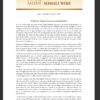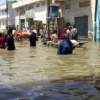The United Nations Office for the Coordination of Humanitarian Affairs (OCHA) has warned that flash and riverine floods, caused by heavy rainfall, could exacerbate the outbreak of waterborne diseases in Somalia. OCHA stated that the floods have come at a time when there is already an outbreak of cholera and acute watery diarrhea in Jubaland State, southern Somalia, and South-West states. According to the Ministry of Health, at least 4,000 suspected cholera cases and 17 associated deaths have been reported from 27 districts since January.
The floods have affected over 175,000 people in Somalia since the rainy season started in mid-March, with 140,000 people displaced. Bardhere district in the Gedo region and Baidoa district in the Bay region are the most affected areas. OCHA warns that if heavy rains continue, up to 1.6 million people could be affected by floods, with over 600,000 displaced. The Juba and Shabelle rivers, as well as parts of the Bay and Banadir regions, are likely to be the most affected areas.
In Bardhere district, Jubaland State, over 21 people died due to flash floods following heavy rains from March 21 to 24. The heavy rains and flooding have come after five seasons of drought that displaced more than 1.4 million Somalis and killed 3.8 million livestock since mid-2021.
OCHA notes that local communities and authorities have stepped up response activities in affected areas. However, it is vital that humanitarian aid organizations continue to provide support to mitigate the effects of floods and the waterborne disease outbreak. The situation in Somalia is a stark reminder of how climate change can exacerbate existing humanitarian crises and how vital it is for the international community to work together to mitigate the impacts of climate change.











